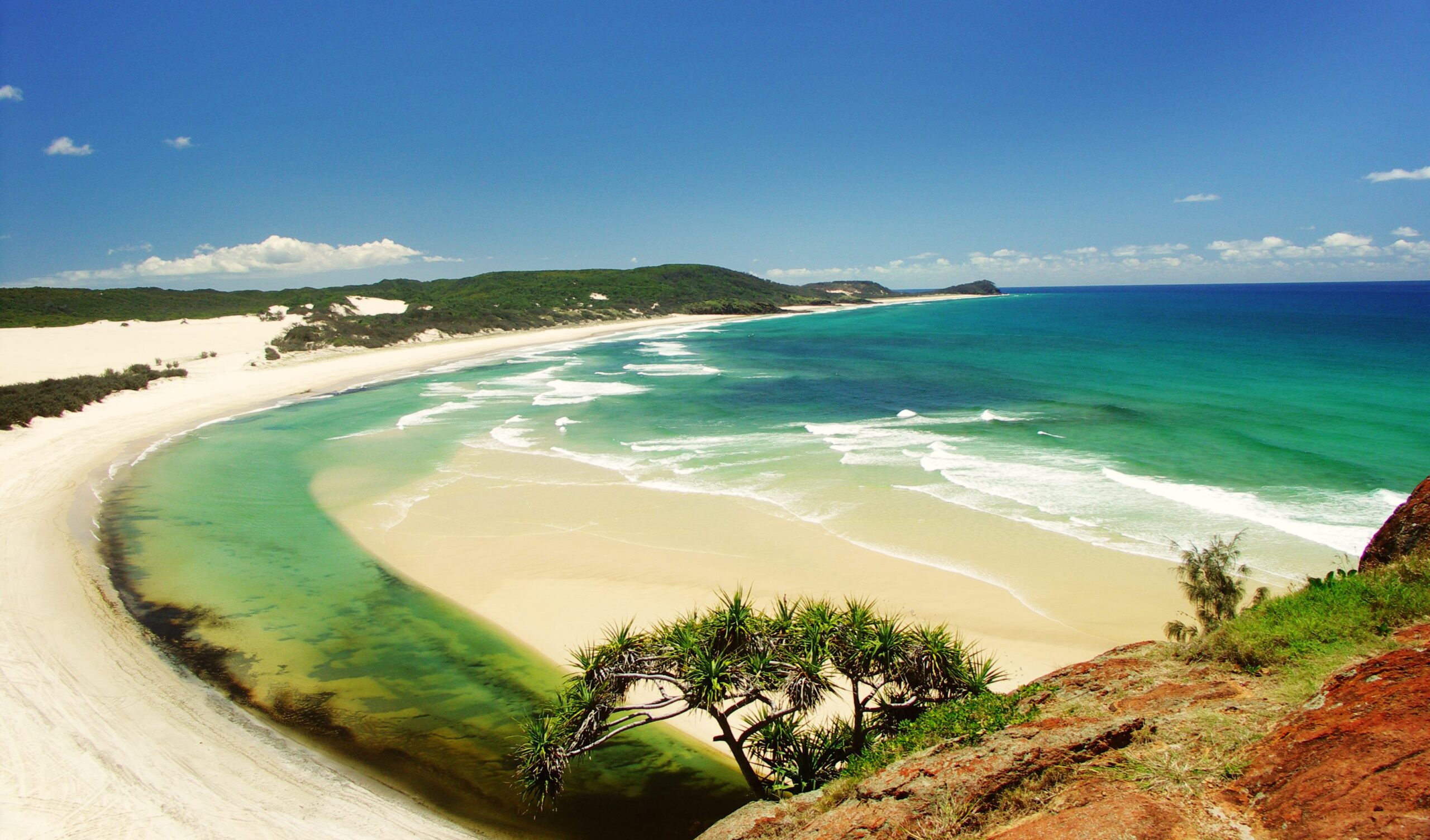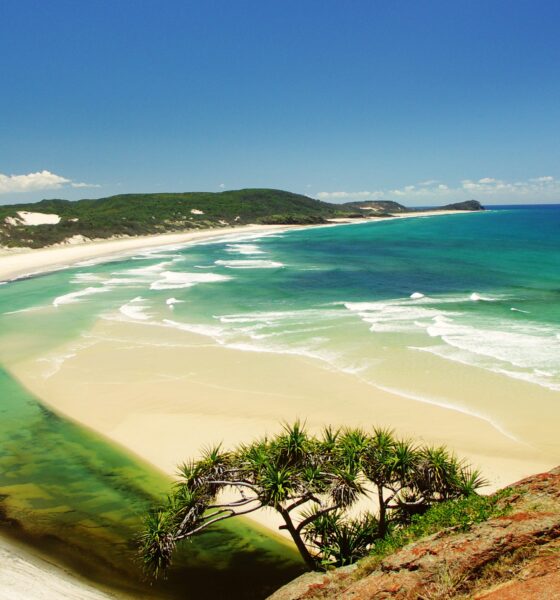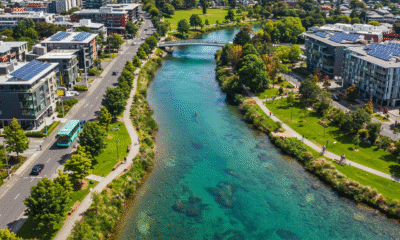

Environment
Should I stay or should I go? The environmental tourist’s travel dilemma
True environmental travel is about education, and not about taking selfies with a bottlenose dolphin.
We rocked and rolled across the sand dunes of Fraser Island – the largest sand island in the world, off the coast of Queensland, Australia.
Our guide told us how unique the location is, how it is home to fauna and flora not found anywhere else and how it is an important ecological site for the world.
“But we’re driving right over it?” I say. “How can this be good?” (And yes, I know I had chosen to do this.) “How else will you see it?” he asked me.
He had a point. But I wondered, should I even be here? However many sapling trees we plant or bananas we don’t eat in an attempt to compensate for our travel, tourism leaves a footprint on the world. We can try to be green, but by travelling and touring we are emitting gases, using fuels and ultimately harming the planet.
Hardcore evangelists of the slow travel movement argue that it is impossible to be green if you fly somewhere, and that in fact, to minimise damage, it’s best if we all just stay at home.
Fraser Island is a top tourist attraction for over 400,000 visitors per year, and sometimes up to 600 visitors at any one site. People promoting tourism on the island tell you how 30 years ago, the island was logged and sandmined. It is only its 1992 listing as a World Heritage site and its 2007 entry onto the Australian National Heritage Register that really kickstarted tourism.
As a sand island, the tides and transitions mean that it regenerates quickly, constantly evolving. But should it be a case of the lesser of two evils? Or can tourism do some good?
Seeing the island isn’t enough. The outcome must be more positive than a mere passive snapshot. The value comes from understanding it, appreciating its uniqueness and resolving to help sustain this.
“If people aren’t allowed to appreciate and experience the importance and beauty of these areas, there will be no general acceptance of the necessity for conservation“, says Rob, owner of an eco-friendly property near Fraser Island.
He cites the example of humpback whales, whose population was once in the hundreds but is now more than 15,000 on the Australian east coast and growing by 10% every year. It was only with the emergence of the whale watching industry that this species became well known, and thus activity to prevent their extinction became active.
A study of tourists visiting dolphin reserves and watching in Tangalooma in south-east Australia found that environmental education can have a beneficial effect upon tourists, but that it must be part of a deliberate programme. It’s not enough to expose them to nature and hope they go away behaving more green.
Education can incite curiosity, emotion, and by allowing motivation and opportunities to act, result in changed behaviour. In fact, six times as many participants who joined an education programme reported an increase in eco-friendly behaviour, compared to those who didn’t.
A successful programme generates action, prompting responsible behaviour as well as increased knowledge and enjoyment. It’s up to tourists to choose one that doesn’t disrupt natural migratory or habitual patterns, and also to ask questions to ensure that they do leave with an enhanced appreciation of the animals, and an outlook of advocacy for environmental support – not just a selfie with a bottlenose dolphin.
One of the Fraser Island tour operators told me in great length how their tour guides all carry rubbish bags with them. But we all know not to throw rubbish; there needs to be something more.
It’s not enough for the staff to be trained and know not to throw litter. Customers and visitors must become active participants, and learn about the unique sanctity of the environment that they are to visit if the experience is to be one that is not only not harmful, but actively resulting in a positive outcome.
The researcher Margaret Lowman writes how in the Galapogos species face extinction due to over stretching of resources and damage from visitors. But she adds that she has seen in other areas the “salvation of exploited tropical regions by the interests of conservation and the economy of ecotourism working collectively“.
Keith, owner of Glass House Ecolodge in Queensland, believes that green tourism operators have the opportunity and duty to “provide guests with enhanced experiences that give them a greater sense of the wonder of the environment and the great outdoors“.
Those enhanced experiences must be active and aim for change. A token payment to offset carbon use isn’t enough. Education that is absorbed and leads to change in everyday life is the only way that the levels of damage inflicted by travel can then be argued to have a long-term positive impact.
And of course, it isn’t just the travel to and from a place, or the visits on a tour, which harm the environment. To fully understand the impact of travel, we would also need to consider resources used for travel, lodging, food, etc – all things that we would be using at home.
It is a mutual responsibility, from those in the tourist industry and tourists themselves, to ensure that they get the best experience and offer back the greatest support for the environment that has hosted them. If we can ensure that despite using these resources we are having a positive effect upon the world, then travel can be an environmentally enhancing experience. Pack your bags and get out there.
Francesca Baker is curious about life and enjoys writing about it. A freelance journalist, event organiser, and minor marketing whizz, she has plenty of ideas, and likes to share them. She writes about music, literature, life, travel, art, London, and other general musings, and organises events that contain at least one of the above. You can find out more at www.andsoshethinks.co.uk.
Further reading:
Ecotourism flourishes when local people are engaged with sustainability
Sustainable tourism: ‘going green’ doesn’t just mean a splash of colour
When on a responsible holiday, do as the locals do
Sustainable tourism: people power and destination stewardship


 Environment11 months ago
Environment11 months agoAre Polymer Banknotes: an Eco-Friendly Trend or a Groundswell?

 Features10 months ago
Features10 months agoEco-Friendly Cryptocurrencies: Sustainable Investment Choices

 Features11 months ago
Features11 months agoEco-Friendly Crypto Traders Must Find the Right Exchange

 Energy10 months ago
Energy10 months agoThe Growing Role of Solar Panels in Ireland’s Energy Future





























